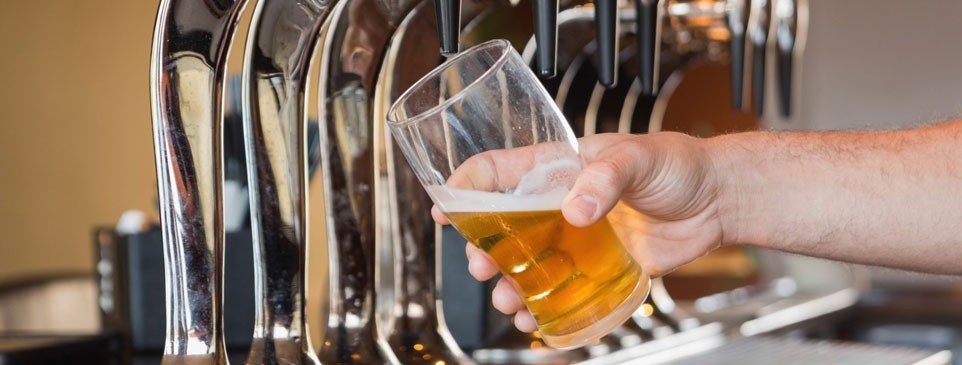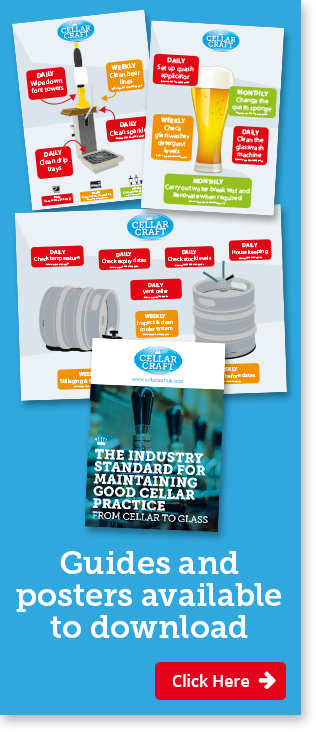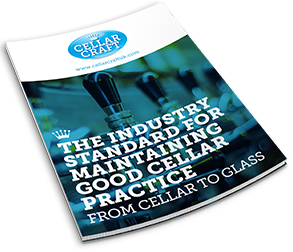Renovate: Liquid or Powder?

Renovation of glassware is an important part of providing the best possible drink presentation to your customer and can sometimes be neglected causing issues such as:
- Poor lacing
- Poor head retention / flat pints
- Poor presentation
All of these can affect how your customer perceives your establishment and how likely they are to give you repeat business or give you positive reviews to friends and on social media. Negative reviews can be damaging to a business and it is of no surprise how quickly word of mouth spreads. You never want to serve a pint in a glass like the one in the picture above!
Why Glasses Need Renovation
Even if you are using the best glass washing system, with the best in water softening technology with the best detergents and rinse aids on the market you will still need to Renovate your glasses at regular intervals to retain the quality.
Over time non-rinseable films will develop as a side effect of using rinse aids (rinse aids use surfactant based chemicals, which reduce the surface tension of water making it slide off the side of the glass into the bottom of the machine), this will leave a very small amount of residue on the side of the glass. As this non-rinsing film builds up it will trap small amounts of proteins, yeast residue, water hardness salts and tannins. When these deposits reach a certain level they begin to impact the behaviour of the beer in the glass causing the issues already listed in the introduction of the article.
New glassware, when it comes from the supplier, is coated in a mould release agent used during their production process along with debris from any etching of any decoration added to the glassware, residues from decorative printing and warehouse storage particulates. All this needs to be removed from the glass before the glass is used to serve the customer with a quality drink.
What is Renovate
There are two styles of Glass Renovation chemical on the market, powder and liquid. Both have different usage methods and while working to give the same results have their pro’s & con’s.
Powder
This is the original glass renovation chemical (Due to trademarking only Proton and Chemisphere may call this product Renovate, all other suppliers must use a variant such as Renovator or Renovating). Usually powdered Renovate is made up of one or more of the following components.
Non-Caustic Alkaline Detergent
This is used to break down and remove proteinaceous material, natural fats & oils, and dirt deposits and remove them from the surface of the glass.
Water Conditioner
Usually a chelant complexing agent which removes calcium and magnesium salts from the wash water and from the surface of the glass, helping to prevent blooms, streaks and water spotting.
Glass Protector
This is a unique chemical which acts to buffer the other components of Renovate powder keeping the pH at an optimum level throughout the whole glasswasher cycle. It will also act to prevent the corrosion of metal surfaces within the glasswasher and corrosion to the surface of the glass itself.
Chlorine Release Agent
This is a low level chlorine release agent which helps the alkaline detergents do their job as well as stripping the non-rinsing films, left behind by rinse aid, from the surface of the glass taking it back to a beer clean state.
Liquid Renovating Products
This is a newer invention although now a few years old and is used as a replacement for the Detergent on a glasswasher and will clean and renovate at the same time. It usually contains one or more of the following:
Caustic Based Alkaline Detergent
Either Sodium Hydroxide or Potassium Hydroxide, these perform the same job as the non-caustic alkaline detergents in Renovate powder although are a lot stronger. This is because you are cleaning the glasses as well as renovating them rather than just renovating already cleaned glasses when using powder.
Non-Ionic Surfactants
In laymen’s terms these work to enhance the detergency of the caustic component of liquid renovates by reducing the surface tension of water, this allows it to penetrate deeper into the soils helping to lift them from the surface of the glass. They will also remove non-rinsing films but only if you use the rinse aid for which they have been designed which can restrict what you buy.
Sodium Hypochlorite
This is used in the same way as the low level chlorine release agent in powder renovate, to aid the detergent and remove non-rinsing films.
So what Are the Pro’s and Con’s of Each Type?
Both sorts of Renovate have one Con in common and that is over use of the chemical will ruin you glasses, these are aggressive products and over time they will erode the surface of the glass making it easier to scratch and reduce its durability, nucleate designed at the bottom of glasses will lose their effectiveness and the drinks will be as flat and lifeless as if you didn’t Renovate at all. Moderation is the key, only use Renovating products when you need to, try out the water break test which can give you an indication of the cleanliness of the glass. If used properly and at the correct frequency Renovate products will keep your glasses in perfect condition for their whole life cycle.
Pros
Powder
Less harsh – Because it contains a low level chlorine release agent and a non-caustic detergent. High levels of caustic detergent and chlorine will cause the surface of the glass to be eroded faster thus reducing the lifespan of the glass.
Dedicated Process – You run this as a dedicated cleaning cycle out of operating hours, this means that you can ensure all glasses are Renovated at the same time and that none are missed. This also increases safety to customers as it reduces the risk of chemical contamination being left of the glass.
Works with Every Rinse Aid – Unlike some Liquid Renovating Products which only work with specific rinse aids due to the use of specific surfactant cleaners.
Manual Use – Powder Renovates can be used as a manual soak in a sink if a machine is not available or suitable due to the type of glass.
Liquid
Faster – as you can Renovate while glass washing during operating hours without having to perform dedicated cycles.
Simpler to Use – As you just replace the detergent on the glass washers autodosing system there is no need to measure out chemicals or refresh the wash water with extra Renovate after each cycle.
Cons
Powder
Takes a Long Time – To use powder Renovate properly you need to spend time ensuring all glasses are have been Renovated, Rinse and a are dry before the establishment opens for service.
Liquid
Can Easily be Overused – As you are supposed to use Liquid Renovating Products over the course of a week, in normal opening hours a glass may go through numerous unnecessary Renovate cycles, increasing it’s change of damage.
Bad Smells – Due to the use of sodium hypochlorite in hot water there is an increased chance of a smell of bleach in the bar and service area during service hours which can be off putting to some customers.
Not All Glasses May be Renovated – If some glasses are not frequently used they may miss out of being Renovated and as such not be properly cleaned.
Can Damage Glasses – Some cheaper Liquid Renovating Products use levels of sodium (or potassium) hydroxide and sodium hypochlorite that are too strong, this increases the damage to glasses and reduces their lifespan.
As both types of Renovate work to give the same results you have to weigh which of the Pro’s and Con’s effect your establishment more, and from this make the choice of Powder or Liquid Renovating Products.
If you have any queries regarding the proper care of your glassware, don’t hesitate to Ask CellarCraft

Download the entire CellarCraft guide
